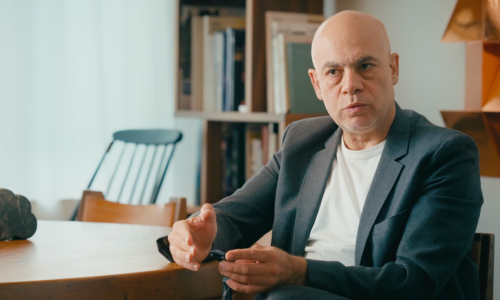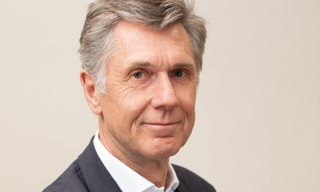The biggest difference between Vietnam and the West is the irrepressible desire of the Asian nation's young people to be successful and leave its poverty behind for ever. They are prepared to subordinate everything to this one goal, writes Marco Martinelli in his exclusive essay for finews.first.
finews.first is a forum for renowned authors specialized on economic and financial topics. The texts are published in both German and English. The publishers of finews.asia are responsible for the selection.
If you’ve ever tried to get to the other side of the road in Ho Chi Minh City with all due caution in keeping with Western European standards, you won’t have made it. The sheer flood of motorcycles and bicycles prevents you from setting foot on the road. That has been the way ten years ago and it still is the case. Bar the fact that there are hardly any bicycles left and instead an increasing amount of luxury limousines.
What remains as an option is the principle of the slow step. Set off, without haste, without swerving to avoid others and all of sudden you will feel the flow of traffic, like water in a river. He who knows this technique is half-Vietnamese already.
Ten years ago, there were hardly any off-roaders to be seen on the streets of Ho Chi Minh City, which are soaked with motorcycles. Today, the picture has changed. Each month, almost 100,000 new workers join the labor market. Young, well educated and hungry for success. Eager to pick the rich fruits of the Western consumer society, they indulge in luxury products and aren’t shy to show off.
«The government has understood that it can’t stop the march of time»
People are consuming like never before. The signs of a growing middle- and upper-class are there for all to see. The central government in Hanoi retains its tight grip and nothing passes without it having a say. But the government has understood that it can’t stop the march of time. The evolution of the country into a production and services economy is in full swing.
Global companies increasingly are moving their production to Vietnam. The stable political environment, an absence of religious conflicts and attractive conditions are the basis for rapid growth.
The government now is about to launch the next phase of growth. It will initiate the privatization of the most important state enterprises in coming months and years. It will bring the necessary financial means to improve the dilapidated infrastructure in vast parts of Vietnam. Mostly national providers will profit from the initiative, such as cement companies, steel factories and providers of construction equipment.
«Luxury homes for the demanding customer are popping up quickly»
What rings true for the cars in Ho Chi Minh City is even more true for the luxury hotels along the almost endless coastline measuring some 3,200 kilometers. The tourist industry is booming: in 2007, the country counted 3 million tourists, last year more than 10 million visited the country. The industry is the backbone of the economy in formerly rural areas. All global hotel chains are present in Vietnam. Luxury homes for the demanding customer are popping up quickly. Many holiday resorts are easily reachable by plane. European and Asian tourists alike are using the opportunity and are booking individually or via tour operators. Thousands of jobs have been created that way in recent years.
The rapid growth has also included the number of listed companies. In 2007, the two stock exchanges in Ho Chi Minh City (HSX) and Hanoi (HNX) had few more than 200 members listed – today, there are 1,200 companies vying for customers. More than 500 of those are on the unlisted public company market UPCoM.
Of course, the sheer number of listed stocks won’t distract from the fact that the top 50 stocks have a combined 84 percent of the market capitalization. The large number of small firms with little volume are simply pulled along by the dynamic of the big players.
Until a few weeks ago, there was hope that the MSCI Frontier Market Segment would be upgraded to the MSCI Emerging Market Segment. Two factors are responsible for why it didn’t happen: the foreign ownership limit in some industries frequently prevents foreign investors to buy stakes in their preferred companies, because there are no freely available shares for foreigners. And secondly, a lot of relevant information is still only issued in Vietnamese.
«Everything is subordinated to this quest with the wish for growth at all cost»
The steady development and professionalization of the stock exchange trading helps save time and money compared with ten years ago. Earlier, in the case of many companies, you had to take an equity booklet to the headquarters of the firm in which you had invested to have your purchase stamped and signed. Today, this isn’t the case anymore and the majority of transactions are processed electronically.
There has also been a lot of change on the labor market: today, there is a large number of well educated, young candidates for positions in the financial market, people with an economics degree and further education, for instance as chartered financial analysts. This wasn’t the case ten years ago.
Like many big cities of this world, Ho Chi Minh City is becoming ever more Western in its appearance. The big fashion labels have all set up shop. What sets it apart is the irrepressible urge of the young to be successful and to leave the poverty behind for ever. Everything is subordinated to this quest with their wish for growth at all cost. If we want to keep up, we will be well advised to up the ante.
Marco Martinelli is co-owner of Turicum Investment Management in Baar, an asset manager specialized in Vietnamese stocks. He has lived and worked in Vietnam for the past ten years.
Previous contributions: Rudi Bogni, Peter Kurer, Oliver Berger, Rolf Banz, Dieter Ruloff, Samuel Gerber, Werner Vogt, Walter Wittmann, Alfred Mettler, Peter Hody, Robert Holzach, Craig Murray, David Zollinger, Arthur Bolliger, Beat Kappeler, Chris Rowe, Stefan Gerlach, Marc Lussy, Nuno Fernandes, Beat Wittmann, Richard Egger, Maurice Pedergnana, Marco Bargel, Steve Hanke, Andreas Britt, Urs Schoettli, Ursula Finsterwald, Stefan Kreuzkamp, Oliver Bussmann, Michael Benz, Peter Hody, Albert Steck, Andreas Britt, Martin Dahinden, Thomas Fedier, Alfred Mettler, Brigitte Strebel, Peter Hody, Mirjam Staub-Bisang, Nicolas Roth, Thorsten Polleit, Kim Iskyan, Stephen Dover, Denise Kenyon-Rouvinez, Christian Dreyer, Peter Kurer, Kinan Khadam-Al-Jame, Robert Hemmi, Claude Baumann, Anton Affentranger, Yves Mirabaud, Katharina Bart, Frédéric Papp, Hans-Martin Kraus, Gerard Guerdat, Didier Saint-Georges, Mario Bassi, Stephen Thariyan, Dan Steinbock, Rino Borini, Bert Flossbach, Michael Hasenstab, Guido Schilling, Werner E. Rutsch, Dorte Bech Vizard, Adriano B. Lucatelli, Katharina Bart, Maya Bhandari, Jean Tirole and Hans Jakob Roth.


























